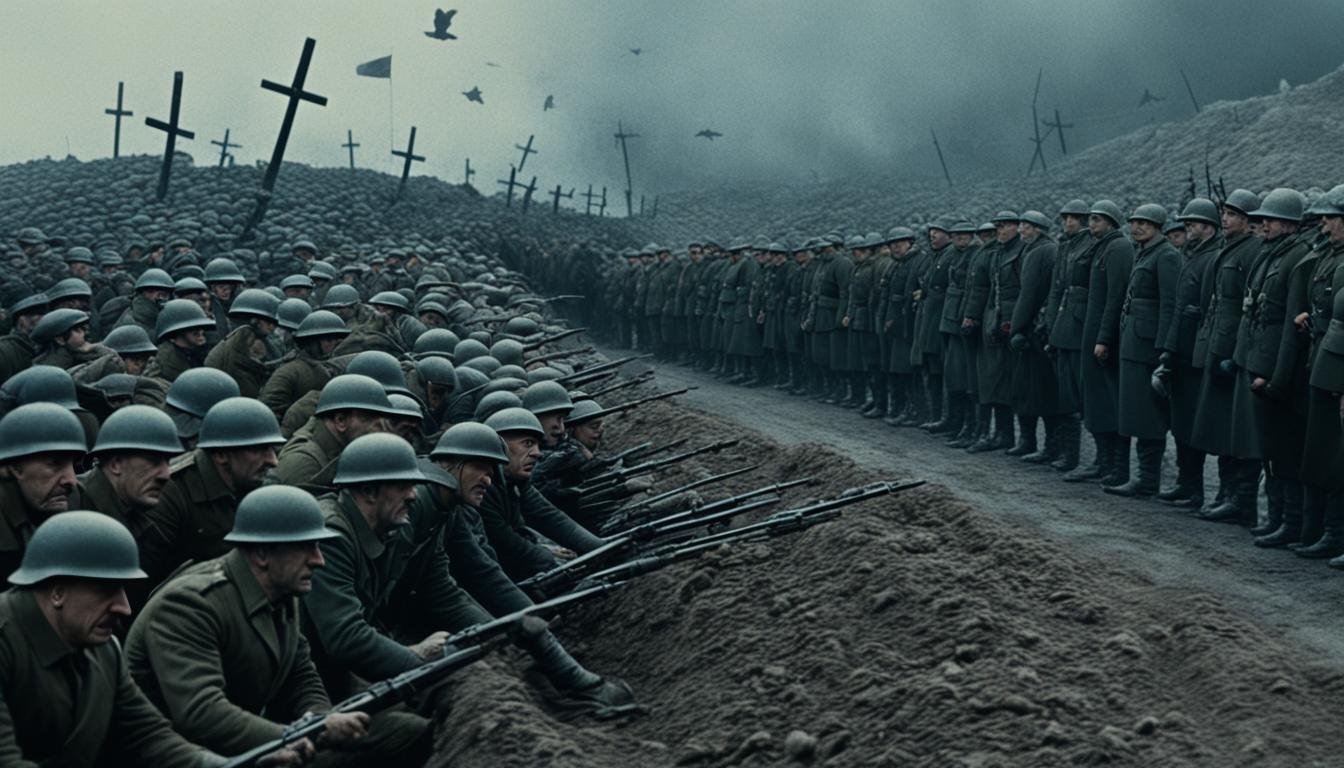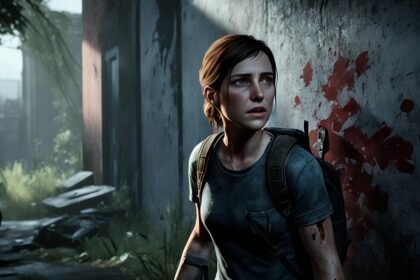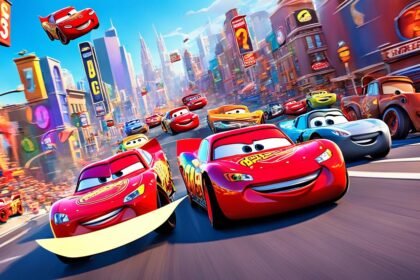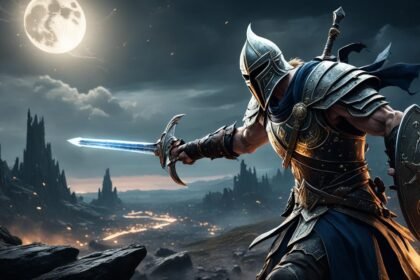Welcome to our look into the film “Paths of Glory.” It was directed by Stanley Kubrick and came out in 1957. The film tells the story of leadership, morality, and the wrongs of war. It’s based on a 1935 book with the same title by Humphrey Cobb. The story shows the dark times of World War I.
Key Takeaways:
- “Paths of Glory” is an American anti-war film directed by Stanley Kubrick.
- It was released in 1957 and looks into themes like leadership and the ills of war.
- The story is about French soldiers who say no to a dangerous attack.
- Actors like Kirk Douglas, Adolphe Menjou, and George Macready played in the movie.
- The film was picked for safekeeping in the US National Film Registry in 1992.
Stanley Kubrick and the Deliberate Musical Choice in Paths of Glory
Stanley Kubrick, the director of “Paths of Glory,” carefully chose the music for the film. This 88-minute movie uses music to tell its story about war in a unique way. The music adds depth and meaning, making the film more powerful.
The film starts with a drumbeat that keeps coming back. This simple beat, played on a snare drum, makes you feel the military atmosphere. It reminds us that the effects of war never go away.
“Paths of Glory” doesn’t focus on how characters change like other war movies might. Instead, it shows war as it really is — a never-ending struggle. The film highlights the challenges soldiers face and the mistakes made by their leaders.
Kubrick details the difference between officers and soldiers brilliantly. This shows the lack of understanding and care from those in charge. The film paints a clear picture of war’s pointless cruelty.
The drumbeat choice helps tie the story together. There are no big, heroic songs during battles. The sound of war itself is the background music, making the scenes realistic and intense.
Made in 1957, “Paths of Glory” was a bold statement against war. It inspired other famous war movies like “Platoon” and “Saving Private Ryan.” Kubrick’s work has left a lasting impact on how we see war in movies.
Table: Summary of Stanley Kubrick’s Films after “Paths of Glory”
| Film Title | Release Year |
|---|---|
| Lolita | 1962 |
| Dr. Strangelove | 1964 |
| 2001: A Space Odyssey | 1968 |
| A Clockwork Orange | 1971 |
| Barry Lyndon | 1975 |
| The Shining | 1980 |
| Full Metal Jacket | 1987 |
| Eyes Wide Shut | 1999 |
After “Paths of Glory,” Kubrick’s films continue to dig into violent and greedy behaviors. “2001: A Space Odyssey” and “A Clockwork Orange” both analyze violence. They show us different faces of human aggression, power struggles, and darker sides of society.
To sum up, Kubrick’s choice of music in “Paths of Glory” and his later films shows his skill in exploring deeper human issues. He doesn’t shy away from the horrors and complexities of war and human nature. Kubrick’s work invites us all to think about the lasting effects of war and our actions on others.
The Visual Contrast Between Soldiers and Officers in Paths of Glory
In “Paths of Glory,” Stanley Kubrick shows us how different soldiers and officers are. The movie clearly shows the huge gap between these two groups.
Soldiers live in muddy trenches. The place is dark and very dirty. Their world is hard, and they must deal with terrible conditions. Their uniforms are covered in blood, and they drink from simple tin cups. This shows their tough sacrifices and the reality of war.
On the other hand, officers live in a fancy chateau. Their setting is full of luxury and excess. They drink wine from crystal glasses and wear clean, medal-covered uniforms. This shows the big difference between soldiers and their leaders.
The film clearly contrasts the lives of soldiers and officers. It points out the big class difference in the military. The soldiers, with their dirty trenches and stained uniforms, are the working class. The officers, with their luxury and pomp, are the ruling class.
| Aspect | Soldiers | Officers |
|---|---|---|
| Living Quarters | Dark and dirty trenches | Wealthy chateau |
| Environment | Muddy and grim | Opulent and luxurious |
| Conditions | Deprivation and sacrifice | Decadence and excess |
| Class Representation | Working class | Bourgeoisie |
The movie talks about social classes during World War I. It shows the rich contrast between the suffering soldiers and the comfortable officers. This makes us think about the military’s social drama and the soldiers’ harsh reality.
“Paths of Glory” shows us the truth about war. It reveals the tough lives of soldiers and how the top officers live. This is a story about class differences and unequal power in the military.
Colonel Dax and the Struggle Between Noble and Peasant Classes
In the movie “Paths of Glory,” Kirk Douglas plays Colonel Dax. He shows us a man stuck between the peasant and noble classes. Dax is the boss, but he understands and helps his working-class soldiers, which makes the high-class officers mad. The film looks at the struggles Dax faces as he tries to move up while dealing with his own modest beginnings.
Dax deeply knows the tough times the working class faces and fights for them. The conflict between lower and upper classes acts as a big theme. It criticizes the French military’s strict structure. Kubrick’s work points out the system’s problems, with its unfairness and harsh treatment of common soldiers compared to noble officers.
Although Dax changes a lot, the film’s thoughts on war stay the same. Even as Dax tries to change things, war’s brutal nature and the views of soldiers and leaders don’t shift much. This shows how the military’s way of doing things doesn’t really change.
Kubrick uses Dax’s story to talk about the gap between the rich and the poor in society. The movie makes us think about the real struggles of the working class. It asks us to consider our own views and push for a fairer world.
Continue reading to explore the other sections of our article to gain a comprehensive understanding of “Paths of Glory” and its profound impact on cinema and our collective consciousness.
Paths of Glory as a Critique of Warfare and Human Behavior
“Paths of Glory” is not your usual war film. It shows the ugly truths of war and the cost of its actions. It discusses the brutality of war and its impacts on those involved. This is unlike movies that only show the heroic side of battles.
The movie looks at the leaders and politicians behind wars, not just the enemy. It questions the ethics of the powerful and the morality of their decisions. This approach highlights the importance of good leadership during war.
“Paths of Glory” shows the horrors of war faced by French and German soldiers. It makes a strong case for peace, pointing out the flaws of human greed and desire for power.
The film dives into issues like xenophobia and the failure to solve conflicts without violence. It sparks a conversation on peace and the need to avoid war’s devastating effects. Through its story, the film highlights the impacts of hostility and the search for diplomatic solutions.
It also criticizes the difference between leaders who order and soldiers who fight. By showing these inequalities, the film exposes the hardships of common soldiers and the unfairness of power dynamics.
“Paths of Glory” also challenges the idea that war is noble. It talks about the senseless loss of life and the moral struggles of military leadership. It points out the high price of seeking glory through warfare.
The movie shows World War I trench warfare’s pointlessness. It emphasizes the huge losses suffered by soldiers in this kind of battle. It argues for a more caring and effective approach to global conflicts.
“Paths of Glory” warns against the destructive path of war. It calls for peace efforts and cooperation. The film’s message still carries weight today, showing the ongoing relevance of its critique on war and human actions.
The Altered Ending of Paths of Glory
Stanley Kubrick and James B. Harris wanted an upbeat ending for “Paths of Glory.” They planned to save the soldiers’ lives. But Kirk Douglas, who acted as Colonel Dax, refused. He thought changing the ending would weaken the film’s message. His choice highlights the value of a bold artistic vision over easy commercial success.
By sticking to the original script, Douglas kept the movie’s themes true. The film didn’t shy away from showing the brutal side of war. This decision underlined the film’s serious message, maintaining its integrity. As a result, the soldiers’ lives were not saved in the end, showing the strength of moral decisions in storytelling.
Kubrick’s insistence on keeping the film’s true meaning stands out. His decision to show the harsh reality of war deeply impacts the audience. This approach solidifies “Paths of Glory” as a daring film that makes people think about war’s true cost.
| Stanley Kubrick Films after Paths of Glory |
|---|
| Lolita |
| Dr. Strangelove |
| 2001: A Space Odyssey |
| A Clockwork Orange |
| Barry Lyndon |
| The Shining |
| Full Metal Jacket |
| Eyes Wide Shut |
Stanley Kubrick’s Influences from Kirk Douglas on Paths of Glory
Kirk Douglas, the movie’s main star, greatly shaped Stanley Kubrick during “Paths of Glory.” Douglas’s deep beliefs and fight for what’s right shaped Kubrick’s films. His impact was not just about making movies but also making the world better.
Moreover, Douglas helped fight against a dark time in Hollywood history. He stood up to the blacklisting of the talented writer Dalton Trumbo.
Douglas risked a lot by naming Trumbo for his great work on “Paths of Glory.” This move showed Douglas’s strong sense of fairness and justice. It also influenced Kubrick’s future films, guiding them towards themes of morality and fairness.
The teamwork on “Paths of Glory” formed a strong connection between Douglas and Kubrick. This bond led to more projects together, like “Spartacus.” Their work together not only impacted movies but also how values were shown in films.
Douglas’s stand against wrongdoing was felt long after “Paths of Glory.” His fight in Hollywood led the way for Kubrick’s focus on moral tales in his movies. Their partnership was not just about making great films. It was about making a difference in the world of cinema and beyond.
Paths of Glory and its Impact on Kubrick’s Filmmaking Style
“Paths of Glory” was crucial in shaping Stanley Kubrick’s film approach. It explored violence, ambition, and stress’s impacts, which became key in Kubrick’s later works.
Kubrick extended these explorations in later movies. “Full Metal Jacket” and “A Clockwork Orange” focus on the darker parts of society and humanity.
In “Full Metal Jacket,” Kubrick looks at the effects of war on soldiers, showing violence and loss of self. The film portrays war rigorously, delving into its consequences deeply.
Kubrick’s “A Clockwork Orange” tackles material gain and extreme human behavior in a dystopian setting. It reflects on humanity and ethics, stirring deep philosophical questions.
Kubrick’s work deeply examines human actions and the impact of pressure. He sets characters in tough spots, provoking thought about our society’s values and the human experience.
“Paths of Glory” launched Kubrick’s dive into these themes and shaped his unique style. His works became known for their deep stories and visual appeal, all thanks to this film.
Kubrick’s Innovative Filmmaking Techniques
Kubrick is praised for his technical and storytelling innovations. He was a pioneer in using visuals and sound to make his stories truly immersive.
Kubrick’s Films Influenced by “Paths of Glory”
| Film Title | Themes |
|---|---|
| Dr. Strangelove | Violence, Cold War, Satire |
| Fear and Desire | War, Existentialism |
| Full Metal Jacket | War, Dehumanization, Violence |
| Spartacus | Resistance, Freedom, Power |
| Barry Lyndon | Social Class, Ambition, Personal Tragedy |
“Paths of Glory” deeply impacted Kubrick and his later films. Its legacy is clear in the lasting appeal of Kubrick’s movies, known for their deep narrative and exploration of human nature.
Through “Paths of Glory” and his later works, Kubrick changed the film scene. With his deep narratives and technical skill, he’s still a major influence today.
The Legacy of Paths of Glory
“Paths of Glory” is more than a movie; it’s a classic against war. Stanley Kubrick directed it in 1957. It’s so important that the Library of Congress picked it for safekeeping in the National Film Registry.
In Munich, it came out on November 1, 1957. The U.S. got to see it on December 20, 1957. This film, only 88 minutes long, showed the world the ugly truths of war. It got people talking about what war does to us.
“Paths of Glory” was made with just $900,000. But it earned more, $1.2 million, at the box office. Everyone loved the cast, especially Kirk Douglas as Colonel Dax, and Kubrick’s direction.
Its big success is not just about money. In 1992, it was picked for the National Film Registry. This choice shows it’s key in cinema’s history, culture, and beauty.
“Paths of Glory” stands out for its deep look into leadership, morals, and war horrors. It shows the unfair treatment of soldiers by higher-ups. It shines a light on the struggles of those in the line of fire.
The movie’s message still hits hard today. It makes us think about war’s costs and tough choices. It warns against the drive for power and the damage of fighting. That’s why it’s one of the top anti-war films ever.
Kubrick’s way of filming and telling stories keeps inspiring new filmmakers. “Paths of Glory” uses camera moves in ways that we see again in Kubrick’s later films. These techniques add an edge and pull us into the story more deeply.
“Paths of Glory is a remarkable, chilling, and remarkable film that carries the impact of true horror. It delivers its message with subtle power.” – Roger Ebert
“Paths of Glory” also sheds light on a real event. It’s based on a novel from 1935 about the wrongful execution of French soldiers in 1915. This movie shows the dark and unfair sides of war. It aims to change how we think about war’s cost and the courage of those who fight.
The movie’s work of art draws us to think deeply. By picking it for safekeeping, the National Film Registry is making sure future generations learn from it. It challenges us to look at war in a different, more thoughtful way.
The Poignant Questions Raised by Paths of Glory
The movie “Paths of Glory” dives into big questions about war and what it means to be human. It makes us think hard about what soldiers have to do and the price of being honorable. It also looks at when loyalty to your country might go too far.
The story is so intense, making us wonder about right and wrong in war. It asks if doing your ‘duty’ always means doing the right thing. And when following orders might lead to bad choices.
“What does it mean to be a soldier? Do you just follow orders, even if they’re wrong? Can you be honorable and still be part of something that hurts innocent people? Is real patriotism more than just showing loyalty?”
In “Paths of Glory,” soldiers are wrongly labeled cowards and are put on trial. This brings up the theme of loving your country too much. It shows the dark side of fighting for what you believe without thinking first.
The main characters, especially Colonel Dax played by Kirk Douglas, face tough choices. They’re caught between doing what they’re told and what they know is right. Watching them makes us think about our own moral choices.
The movie makes us doubt what we think about duty and honor. It shows us the heavy price soldiers pay. And it makes us question what patriotism really means.
Thinking about “Paths of Glory” makes us rethink war and its personal effects. It pushes us to be kinder and fairer in a world that often seems too harsh.
“Paths of Glory” tells us to think deeper about war and the heroes who fight in it. It asks us to really consider what duty, honor, and love for our country mean. Especially when war and loyalty can lead us to do bad things.”
Conclusion
“Paths of Glory” is seen as a top movie. It pulls in the audience by showing war clearly and digging deep into what makes us human. In just 88 minutes, the film makes a mark. It does this by showing war’s unchanging face to those fighting it. The story is strong, showing the true harshness of war, no matter the time or place.
The film contrasts the soldiers’ tough life with the comfort the officers live in. This comparison points out the big class gaps during war. It shows how some people bear the most suffering and loss.
Kirk Douglas shines as Colonel Dax. His role not only made him a big Hollywood star but also shaped Stanley Kubrick’s thinking. Douglas fought for fairness and pushed for Dalton Trumbo, a blacklisted writer, to get his due for “Spartacus.” This underlines the movie’s strong sense of right and wrong.
After “Paths of Glory,” Kubrick made more films like “Full Metal Jacket.” They also dive into how humans act under pressure and in fights. The movie still matters, urging us to challenge those in power and do what’s right. This makes “Paths of Glory” a key part of film history.
FAQ
What is “Paths of Glory” about?
“Paths of Glory” tells the story of a 1957 American anti-war movie. Stanley Kubrick directed it. It discusses important topics like leadership and justice during World War I.
Why did Stanley Kubrick choose a snare drumbeat as the opening and closing musical cue?
The snare drumbeat was chosen for a reason. Stanley Kubrick wanted it to show the tough reality of war. It reminds us that war brings misery and the wrongs of greed and ambition.
How does “Paths of Glory” depict the contrast between soldiers and officers?
The movie shows a clear difference. It takes us from the dirty, difficult life of soldiers in trenches to the luxury of the officer’s chateau. This shows a big gap between social classes and the struggles they face.
What is the role of Colonel Dax in “Paths of Glory”?
Colonel Dax, played by Kirk Douglas, is at the center. He leads soldiers who won’t fight a hopeless battle. He’s caught between serving the rulers and caring for his men. This puts him in a tough spot.
How does “Paths of Glory” portray war and its consequences?
The film looks at the people who lead wars, more than the soldiers fighting. It’s critical of how wars are run and the lack of peaceful solutions. It shows the terrors of war on both sides.
Was the ending of “Paths of Glory” altered?
At first, they thought about changing the end to save soldiers. But Kirk Douglas said no. He felt strongly about the original message. This shows his commitment to staying true to the movie’s heart.
How did Kirk Douglas influence Stanley Kubrick during the making of “Paths of Glory”?
Kirk Douglas’ moral values deeply impacted Kubrick. Douglas insisted on giving credit to blacklisted writer Dalton Trumbo. This teamwork influenced Kubrick’s future works. It showed him the power of standing up for what’s right.
What impact did “Paths of Glory” have on Stanley Kubrick’s filmmaking style?
“Paths of Glory” greatly affected Kubrick’s themes and style of filmmaking. It introduced him to powerful topics like violence and greed. These became key themes in his future works.
Why is “Paths of Glory” considered a culturally significant film?
The movie is a well-respected anti-war classic. It was even picked for preservation in a film registry. It looks deeply at leadership, morality, and war’s tragedies. These make it important for cultural study.
What questions does “Paths of Glory” raise?
This movie makes us think about the soldier’s role and what duty means. It explores honor and patriotism. It urges us to think about war’s moral challenges and what it means to be human.








